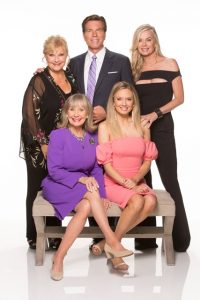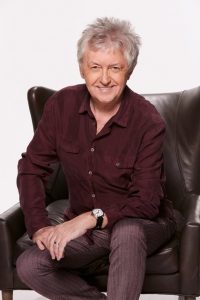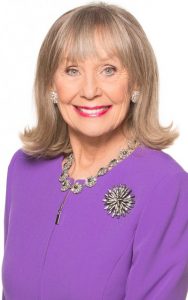We spoke with Mal Young, Executive Producer and Head Writer of The Young and the Restless, about the upcoming Alzheimer's storyline centering on Dina Mergeron and the Abbott family, which begins Friday, November 17 when Dina's family learns of her diagnosis. The daytime drama is in its 45th season on CBS. Many of the cast and crew have been impacted by Alzheimer's, including Mal, who lost his mother to the disease, and participated in this year's Walk to End Alzheimer's to show their support for the millions of people facing the disease.
Firstly, Mal, we are sorry to hear about the loss of your mother. Surely she would be so proud that you are addressing the Alzheimer’s crisis publicly and head-on. What was life like with her, growing up, and then after her diagnosis of Alzheimer's?
 I had very humble beginnings in Liverpool, England growing up with my older sister. My mom worked in a cake shop and my dad was a milkman. Although we lived modestly, we were exceptionally happy.
I had very humble beginnings in Liverpool, England growing up with my older sister. My mom worked in a cake shop and my dad was a milkman. Although we lived modestly, we were exceptionally happy.
My parents gave me my love of television, being huge television watchers in 1960s and 1970s. In 1960, the British soap opera Coronation Street (which is still running today) began. My mom watched every single episode every day of the week until the day she died. I was bound to – and born to – work in soap operas, as I grew up in a home and society where these shows were such a huge part of life. I am a lifelong storyteller because of my upbringing.
When my dad died, my mom truly fell apart. She was depressed and clung to her job, which seemed to be the only thing keeping her afloat. But then my sister and I received calls that she wasn’t showing up to work, or that she was making mistakes like giving people the wrong change back for their purchases. When she had to give up her job, it was a massive hit. I think she was terrified of coming home. It was empty inside that house, and she must have felt very alone.
So many people I’ve talked to can relate to this loneliness and the heartbreak that emerges when one grapples with Alzheimer’s disease. My mom was married to my dad for 53 years, and after he passed, Alzheimer’s seemed to seep in and take over. It weakened her. Although I phoned her every day after dad died, I would just listen to her say the same thing over and over. Alzheimer's had changed her before we even knew it had made its appearance.
One day when I was back in Liverpool visiting mom at her house, we were watching television, as we so often did. She had always been very “house proud”; she was always constantly tidying up. I noticed that something was off about her television set. I got on my knees and put my finger on the screen and discovered it was thick with dust. The chill I got was all consuming. That is when we went to the doctors and had tests done, and soon after, I watched the light go out in her eyes. That was truly the beginning of the end, and my sister and I sought out a proper dementia care facility to help care for our mom. 
Although I could now afford the biggest and the best place for mom to live (and sort of wanted to show off that I could), my sister made me see that mom would want to be somewhere comfortable, and nowhere grand or opulent, as she had always lived modestly in a small house. We found a nursing home in Liverpool where mom could see the rooftops of the buildings where she grew up from her new bedroom. She regressed from that point on, often asking where my dad lived, or fell into moments where she thought she was 16 years old and asked when her mom was coming to see her. It broke my heart, but I never corrected her.
What can you share about the Alzheimer's story arc launching on November 17? How does this topic fit into the Y&R universe, and did you pull from your own life and experiences to tell this story?
Soap operas, particularly in the United Kingdom, have always had a great tradition of taking real life issues and touching audiences with them. In America, Y&R was historically the first soap to feature this type of material.
In my career, I have learned that I don’t want to preach to people. I’ve tackled the difficult topics through my television work: domestic violence, breast cancer, children with disabilities. But I am simply a storyteller providing a mirror to society, saying: “This is you.” Featuring these topics opens our audience up for discussion and it helps people grappling with these issues realize that they aren’t alone. We want them to see themselves in the characters, and they want to be heard.
It’s my belief that drama should reflect the bad and the good of life, and I’ve always approached it in an optimistic way.
As human beings, we take our knocks and build ourselves back up. We keep calm and we carry on. Soap operas can be very therapeutic for the audience, and I know from experience that if I’m in a room with 10 people, nine of them can relate to the topic of Alzheimer’s because they’ve experienced it in one way or another. As much as it’s important to include crime and love and comedy in the stories we tell as entertainers, it’s also greatly valuable to highlight an important health crisis and situation in life that millions of people can connect with.
Rather than go the route of making a dull documentary, I choose to entertain and inform. We can depict Alzheimer’s in almost real time, unfolding the storyline week after week. Viewers that come along on this journey may feel pain, but they will also feel like part of the Abbott family, or see their own experience with the disease be reflected through the medium of television. It makes for amazing, important drama.
You have a great history in television, and on your Twitter account you say your life is a soap opera. What opportunities did you see in taking this role on at Y&R? Was it always your goal to change the conversation, addressing a topic such as Alzheimer’s?
As much as people focus on the drama of soap operas, I can’t resist doing comedy. It’s said that everyone who comes from Liverpool is a comedian! I always find the bright side of life, even in the tragic.
After mom moved to the nursing home, she staged a genuine breakout. She got a group of women together, like in the film The Great Escape. She worked out how to get to a fire door on another floor and my sister and I were both brought in, like parents being called to their child’s school after he or she is sent to the principal’s office. It was very serious, and yet I found this tragic black humor in it. While people were up in arms about it, I was so proud of her. It took the air out of the situation a bit, and I thought to myself: “Yes…good on her.”
I put a lot of my mom into the Y&R character of Dina. She will sometimes say outrageous things, with no filter. It’s fun, funny and heartbreaking all at once. As entertainers, we are here to implore, to excite, to surprise and to of course entertain. Y&R may not be a public information source, but it can balance entertainment with knowledge that isn’t patronizing to our audience.
Can you tell us a bit more about how Dina Mergeron’s Alzheimer's disease will play out? What decision-making went into choosing this particular character and family for this story arc?
The effects of Dina’s disease are far reaching and multi-faceted – not only does her illness take her from the position of powerful businesswoman to a much more vulnerable place, but it also erodes the relationship with her children that she’s worked so hard to rebuild. We want to show the light and the shade: the difficult, emotionally-charged moments for all affected, along with the lighter, even sometimes humorous side to the subject.
We chose the Abbott family because Dina has a complicated relationship with her children, and the Abbotts place a large emphasis on their family legacy and name, and to watch those ties be affected and challenged in an emotional way will help us to portray many sides to such a complicated and relevant issue.
How should we expect Dina's diagnosis to impact her family and her relationship with children - and her children's relationships with each other? What will it be like for the Abbott family to learn about Dina’s diagnosis after her being absent from their life for so many years?
We see the Abbott siblings divided over their personal responsibilities to their mother, particularly Ashley and Jack. Dina came back to Genoa City to mend the rift between her and her children, and though it was not an easy journey, Dina became a readily accepted member of the Abbott family. However, when her disease begins to take hold, it becomes obvious that Ashley wants to avoid talking about the situation, while Jack wants to do everything in his power to stop it. This creates a divide between the two siblings, both in a professional and personal sense.
Why was it so important to use your platform to address this topic? What would you say to people who don’t know much about Alzheimer's, or who may think someone in their family is affected?
The value of this storyline playing out week after week is that we can focus on those smaller, everyday details. We can show the whole journey, and viewers can engage whether they have been affected by the disease or not. I hope that viewers with experience with Alzheimer’s can relate to the material so that they feel less alone.
People who don’t know about it need to know about it. I can pick up any newspaper and find a story about it. Unfortunately, it seems like it is much more prevalent than in the past. Organizations like the Alzheimer’s Association have brought this to the front, and the lines of conversation are open, not tucked away. No one has to be ashamed.
There are lots of ways to engage with a soap opera. If we can help enlighten people – not educate, but touch and inform – we can be a bigger part of the conversation. We approach this story about Alzheimer’s with respect and plan to interpret it responsibility to our audience and all people affected by the disease.
With drama, we go deeper. When it is time to be lighter, we want people to laugh with our characters. We want our viewers to dream and hope with them, because that’s what life is all about – emotions, connections. The human spirit is a powerful thing, and we plan to do it justice.
Learn More: